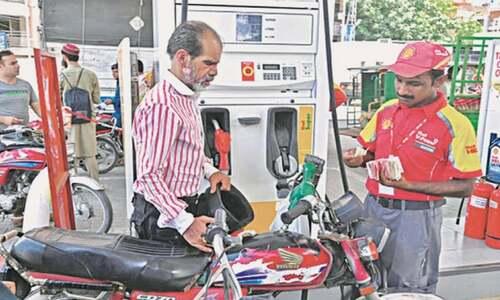
People believe that inflation is up in Ramazan and they swear they experience it — even in Naya Pakistan.
Politicians sitting on opposition benches second this viewpoint and exaggerate the painful experiences of the public. But the government keeps highlighting its efforts to maintain a check on prices of essential commodities and claims that these attempts are paying off — and inflation is coming down.
This is what we have been witnessing for decades. And this is what we see in the government of the fiercely ambitious PTI.
The list of food items on SPI and CPI does not truly represent the fast-changing consumption patterns. Thus, inflation numbers become disputed
Far from the madding crowd, officials of the Pakistan Bureau of Statistics (PBS) monitor inflation indices the way they have been doing for decades — and central bankers wonder whether there is any link between Ramazan and inflation. Occasionally, they do some research as well.
In one such research exercise published back in 2010, two deputy directors of the State Bank of Pakistan (SBP) — Muhammad Akmal and Muhammad Usman Abbasi — wrote: “On the basis of the results (of the research study) we can conclude that the overall CPI (consumer price index) inflation may not increase in Ramazan. However, the opposite may be true in (the) case of explaining (the) Ramazan effect on individual items.”
“This is an important finding,” they correctly emphasised, adding that it should “help policymakers to concentrate on other reasons of explaining inflation during Ramazan.”
Have the policymakers concentrated on other reasons? Have they shared the results with the public? Sadly, the answer, at least to the second question, is no.
Politicians love to look busy even if they are not doing anything worthwhile. For them it is but natural to repeat their assigned roles ahead of and during Ramazan every year. The opposition is supposed to criticise the government for perceived price hikes and the government is supposed to assure people that those engaged in hoarding and profiteering will be dealt with iron hands. Roles are assigned and played year after year with the only difference that the faces representing the opposition and the government keep changing.
Before and during every Ramazan, prices of food items rise to new heights and both sensitive and consumer price indices capture this trend.
Whereas CPI inflation stood at 8.8 per cent in April, ahead of Ramazan, a high increase in the prices of some food items was recorded — tomato 124pc, onion 36pc, moong 26pc, fresh vegetables 23pc, sugar 21pc, gur 20pc, spices 17pc, fresh fruits 16pc and meat 12.6pc.
Whereas annualised SPI inflation stood at 12.4pc on May 2, the prices of several food items in the SPI basket showed much higher increases — garlic 47pc, moong 31pc, sugar refined 27pc, red chili powder 26pc, gur 20pc, beef with bones 13.4pc mutton 10pc and gram and masoor pulse 10pc.
The problem with food inflation monitoring is that the list of food items on the SPI and the CPI does not truly represent the fast-changing consumption patterns. Thus, inflation numbers become disputed. The list becomes all the more non-representative in Ramazan when certain food items and fruits and vegetables are consumed in high proportion. Expanding the list of the items on both indices is long overdue. Once it is done, it may hopefully lend more credence to inflation numbers throughout the year, including Ramazan.
As for keeping a better check on the movement of food items’ prices in Ramazan, administrative measures alone cannot help us. When demand for certain items particularly fruits rises, price checking committees and district officials have no magic wand to bring them down. Long-term and sustainable solution to the problem lies in improving the yields of food crops and fruits and vegetables, building better storage facilities, improving the supply chain and the development of dependable weather monitoring and future price forecast systems.
This requires the development of an inter-dependent and harmonious work culture in the federal and provincial governments and agencies and real-time liaison with global and regional weather monitoring agencies and food trade authorities so that we can seek prompt help from other parts of the region in the case of unusual rains, floods or drought.
Activating the least-functional Saarc Food Bank and development of similar food banks under the aegis of other regional bodies is also important. Sadly, such issues always remain hostage to geopolitics.
When it comes to keeping food prices under check at the time of an unusual increase in demand, like in Ramazan, we must have baseline data to rely on for future planning. Can policymakers tell us with some accuracy the trends seen in the past five or 10 years in domestic wheat and cooking oil consumption in Ramazan? After all, if demand for wheat-based food delicacies and fried snacks goes up at the time of iftar and sehri, it also falls during the day when a large segment of population is fasting. Or can they tell us how Ramazan-induced demand for poultry, milk and meat varies in the country when the holy month falls in summer or winter?
Central bankers generally recognise the importance of inflationary expectations in fuelling inflation in the short term. Repeated airing of deafening breaking news on electronic media regarding price changes triggers a self-fulfilling prophecy. Is this really the case? Have our policymakers ever bothered to find out?
Inflation in Pakistan is often rooted in fiscal indiscipline and in the consequent rupee depreciation. If you raise taxes on oil just as the current government has done ahead of Ramazan, prices of food items will most likely increase further.
Ramazan Mubarak!
Published in Dawn, The Business and Finance Weekly, March 13th, 2019











































